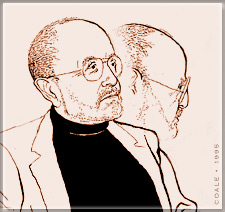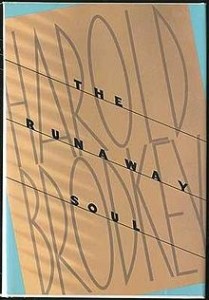Few literary reputations have fallen as precipitously as that of Harold Brodkey.
From the time his first stories appeared in The New Yorker to the publication of his acclaimed collection First Love and Other Sorrows (1958), Brodkey was considered a writer of outstanding promise. When word got out that Brodkey was working on a massive novel, portions of which appeared over the years in several magazines and journals, it was proclaimed by some as a work of genius and Brodkey as important a writer as Proust. As years went by, with his only other publication being Stories in an Almost Classical Mode (1988) and various essays and occasional pieces appearing in such places as diverse as Esquire and Anteaus, critical opinion turned. Brodkey was now more often accused of being a fraud, his much-delayed novel a hoax and his literary skills negligible. Opprobrium was directed at Brodkey’s person, at the advances given to him from publishing houses to which his novel was shopped around and at those who once championed his work. Stories that once were said to be masterpieces, such as “Innocence” and “His Son, in His Arms, in Light, Aloft,” were dismissed with such venom that one suspected the critic making the negative comment had been personally insulted by Brodkey at some private event.
When his novel finally appeared in 1991, having undergone a title change from Party of Animals to The Runaway Soul, as well as going through extensive revisions and stylistic changes from the portions that had appeared earlier, critics and readers responded negatively. Few serious novels, in my memory, have been savaged in the way The Runaway Soul was or how its author was publicly pilloried, with some reviewers leaving the distinct impression that Brodkey had committed some grave moral offense that could not be forgiven.
While he continued to publish after the failure of The Runaway Soul, producing another novel and more short stories, along with a book about Venice and a memoir of his battle with AIDS, by the time of his death in 1996 Brodkey’s literary reputation was in tatters. Now approaching twenty years since his passing, Brodkey’s works are out of print and his name has fallen out literary conversation. There are no planned symposiums on his work or person, or a even biography in the works, that would suggest a revival of interest in his work.
It is not hard to see why The Runaway Soul did not succeed. Brodkey’s novel is demanding in ways so few novels today are. There are few incidents across its sprawling text and its focus, instead, is on the obsessive and microscopic chronicling of the sensations and shifting consciousness of Wiley Silenowicz, a stand-in for Brodkey, and his coming of age in the American Midwest; and on Wiley’s love, sometimes sexual and erotic, with the various people in his life. The novel is marked by two erotic and explicit episodes that take up a great part of the book’s explorations of Wiley’s consciousness.
Where most novelists will reveal a character’s inner consciousness as it develops over time and in chronologically laid-out incidents, Brodkey has time move at the pace of consciousness. Time becomes pliable, slowing down and speeding up in Brodkey’s focus on closely examining those handful of incidents in Wiley’s life. What fascinates Brodkey is how such incidents can never yield a single final truth, that each remembrance will offer up a new sensation, an additional fact and emotional register. It is the plenitude, excess and complexity of experience within those snapshots of time that most fascinates Brodkey. Think of it as a radical form of phenomenological realism where traditional realism, as developed in the 19th century novel, is unable to go. Brodkey’s realism also requires a new kind of writing , one that can capture the subtle changes happening to Wiley’s consciousness. What Brodkey develops is a writing that captures the different emotional and intellectual registers of consciousness, but one that is not in anyway linear or continuous. It is a style marked by excess, capriciousness and expansiveness. It is a headlong rush that can change on a dime, moving from the portentous to the subtle, from the mundane to the profound. Language is stretched to the point of breaking in the rush to capture every nuance, even if at times, Brodkey has Wiley struggling to find the right words and expression for what is happening, and sometimes failing and flailing in the process. Here is Wiley describing Ora and he in the prelude to having sex:
The way we were doing it ̶ the ironic thing and the physical effort and the showiness and the sincerity ̶ from time to time ̶ and that stuff being shown (rather than the physical mattering most) ̶ well, in body-surfing, you land on the beach and you’re okay and you think back over your recent ride so you can have it in near-consciousness, so to speak (but the memory is all rushed and a lot of what happened is hidden from you inside the sense of wondering pleasure), you have bits of a conscious large-scale stuff, and then being young and bare-fleshed and borne along by the melting green locomotive. Something unhallucinatory, something graspable, the shine of faint sweat on Ora’s face, the faint fakeries of the posture in the first place ̶ I’m not comfortably a showy fucker. I’m hammy. Ora said, Oh you beautiful man . . . But, see, it was proof of a kind of wrongness ̶ which was okay ̶ it went with the thing of sex being softly and oozingly mechanical and breath-driven, and unmechanical, and fitting and suitable, and loving and stupid ̶ and not stupid ̶ and grand really only, sublime, a little ̶ as when you were small and were on a swing and went too high and suddenly the sky was there and light and infinite air and a separation from the world which was infinite, infinite ̶ for a second. That was here judgement ̶ her view. I am guessing at it. It’s the body parts and then the motions of them. And the minds. Glittery, amazed, semi-opaque ̶ like eyes. Two wills, changeable, and then the applause, thunk, thunk, of abdomens. And the permissions, I suppose. The glimmering lights of birth are echoed here, are repeated in a kind of semi-inverted animal talk.
In ‘Grammar and American Reality,’ Brodkey argues that there is no agreed upon and no ‘polite,’ American English. “We have no real over-tongue, no equivalent to hochdeutch or serious standard-British English or Tuscan.” Instead, American English and grammar is marked by a “crudity of spirit (in the sense of not anciently derived spirit) and aesthetic hubris (in the same sense), mark any intelligent us of English . . . We unconsciously admit that a proper use of English is, ipso facto, an eccentric use; and, so, we overpraise proper or seemingly proper writers who write a rather poor but pretentiously schooled English.” And later, in “Language is Articulated Consciousness.’ Brodkey writes, “Let me being with the notion that language is articulated consciousness. Articulated how? Articulated for the purpose of comprehension in real time among the physical laws of breath and hearing or eyes and comprehension.” While neither of these two essays can be called aesthetic manifestos, they do reveal a lot of Brodkey’s own principles behind his writing, especially the shift away from the kind of proper-English, middle-class American realism that so excited reviewers when his early stories appeared in The New Yorker, to the examination of interiority and the stylistic complexity and daring that came about with that shift in focus, and which offended so many.
For those interested in exploration of the personal, of daring and complex writing, there is much to be learned from Brodkey’s work. The question is, will there come a time when Brodkey’s work and The Runaway Soul will be given their due? It is impossible to tell. Literary reputation is difficult to predict and the standing of a writer can be impacted less by the quality and aesthetic daring of a work and more by changes in literary taste and what engages critics at the moment. Literary modernism and experimentalism has been replaced by nostalgia for the 19th century novel and traditional psychological realism in the mode of Tolstoy and Dickens, and works written in the style of the middlebrow fiction popular in the 1950s. Look at the number of novels and short stories being published now to great acclaim that can sit easily amongst the same readers that made Grace Metalious’ Peyton Place a best seller in 1956.
Sometimes what keeps a writer being read is the passionate devotion of a group of dedicated readers and critics who can champion that writer’s work. Brodkey now waits for those readers.


